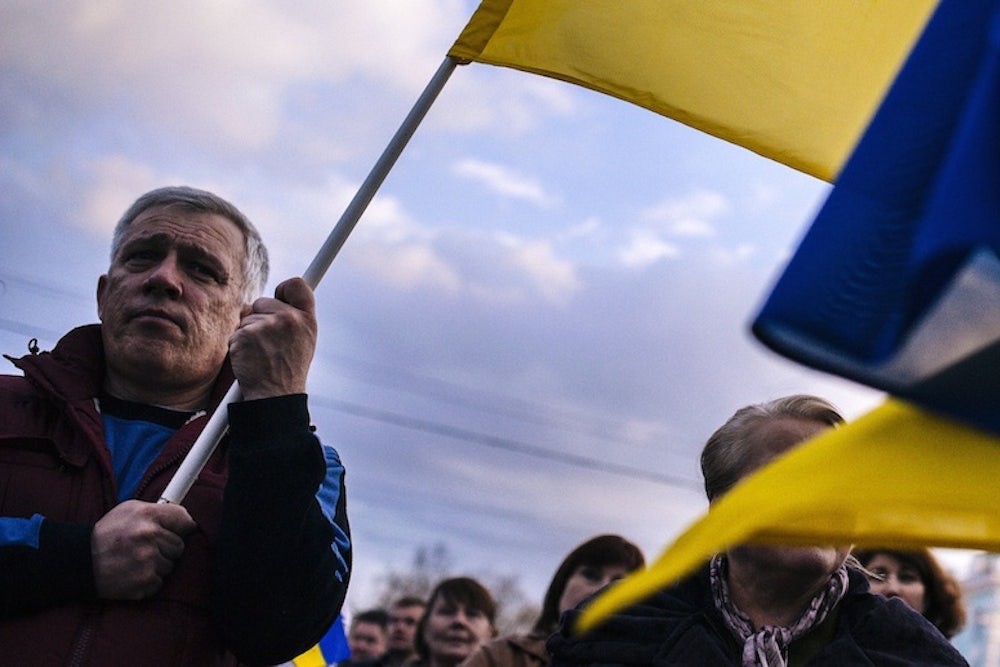There are no tank battles or carpet bombings, but war is creeping into Ukraine. When Russia invaded Crimea last month, it was more of a parade—the Ukrainian army put up no real resistance, and the locals were either pleased with the turn of events or apathetic. This time, a nastier conflict is emerging in Donbass, an agglomeration of mining cities and towns including Artemivsk, known in times of peace for its sparkling-wine factory but also home to one of the country's largest weapons and ammunition stores. In recent days, groups of heavily armed men in modern combat fatigues with no insignia have been emerging, as if out of nowhere, in each of these towns and taking over local government buildings. They became known as "the little green men," a childish idiom which normally refers to aliens from space. The men are definitely not little, but they are certainly aliens in Donbass. They are unable to find their bearings in these miners' towns, speak Russian with a wrong accent (using words normal for St. Petersburg but not Ukraine), and they carry ultra-modern weapons that are unavailable in Ukraine. Journalists and politicians in Kiev are adamant they are Russian special troops, mixed with Crimean and local policemen who switched sides after losing to pro-democracy protesters in Kiev last winter. People also suspect local "Cossacks," paramilitaries who spent years training in "patriotic" summer camps run by Moscow-friendly organizations.
Once the "little green men" take over a building, a few hundred unarmed supporters pour in to build barricades and serve as a human shield in case Ukrainian security forces decide to attack. These became known as "colorados," after the Colorado potato beetle—a nasty pest that sports black and yellow stripes on its back, same as on St. George ribbons worn by pro-Russian activists. The ribbon, which harks back to a Tsarist-era war medal, has become a symbol of Russian military glory in recent years. Some call it "Putin's swastika." There are more locals among the "colorados," but their commanders—always busy talking on the phone with their superiors and giving quiet orders to the protesters—often fail to produce the trademark "gh" sound that distinguishes Ukrainians and southern Russians from Russians who live around Moscow and St. Petersburg. The "colorados" are not a homogenous group; they are comprised of Communists nostalgic about the USSR, Russian nationalists including outright fascists, and a whole bunch of fringe groups, such as neo-pagans. Some of them favor a federal Ukraine, with Donbass ruled by its own government. Others want their region to join Russia.
The pro-Russian movement has become known as "anti-Maidan," as opposed to the Euromaidan protests that rocked Kiev and other Ukrainian cities last winter. But although the anti-maidaners largely model themselves on their enemy—same makeshift shields and helmets, balaclavas, baseball bats, Molotov cocktails, and a penchant for occupying government buildings—there is a stark contrast between the two movements. At the height of the peaceful protest last December, hundreds of thousands rallied in Kiev. The population of Donetsk, Donbass's main city, is three times smaller than Kiev's, but the anti-Maidan rallies have drawn a maximum of 7,000 people—a disproportionately low turnout. In a recent post on the Russian social network Vkontakte, an anti-Maidan activist in Ukraine's easternmost region of Luhansk lamented the lack of support for anti-Kiev protesters among locals. He went as far as using Euromaidan as an example of a protest sincerely supported by the entire city—"even grannies were bringing food for people standing in the square." (Of course they all had been duped, he added in a disclaimer.) The anti-maidaners appear marginal, their claims to represent the local majority entirely bogus.
But who does the majority support? Local residents' apparent neutrality is the biggest problem for both sides. Pollsters often talk about a Soviet, "industrial" mentality in Donbass and other southeastern regions. While unsympathetic commentators call locals apathetic, sympathetic ones say their love for factory-style order and discipline make them naturally opposed to the very idea of a protest or a political upheaval. That kind of mentality makes them vote for non-ideological candidates who are seen as efficient managers, however bogus the image, like the ousted President Viktor Yanukovych. It also explains why many people in the region opposed the Kiev protests. Both Yanukovych and Russian President Vladimir Putin have encouraged this mentality for years, but now they are falling into a trap they themselves created. Southeast Ukraine may be the world's most difficult and unwelcoming environment for fomenting a genuine protest—stability tops the list of local values and priorities. Many local residents admire Putin for bringing that to Russia, but what he is now peddling in Ukraine is instability, and that's a very tough sell.
Russia's efforts are getting increasingly counterproductive. In fact, Putin has become the single biggest force helping to patch up the split between Ukraine's nationalist west and Russophone east. While the West and many Ukrainian politicians continue to alienate Ukrainian Russophones by treating them as if they are an unfortunate historical error, Putin did more than all of them combined to awake many in Ukraine's east to the fact that their country, however imperfect, is a better place for a Russian speaker than Russia proper is. A recent poll show that a majority of people in Ukraine's Russophone regions don't support separation.
The Ukrainian government's response to what looks increasingly like a full-out Russian invasion has been pathetic so far, in terms of both security and creating a positive atmosphere for Russophones. So were Western sanctions. But with each new casualty and each new "colorado" scaring off stability-obsessed locals, Putin is slowly defeating himself.
